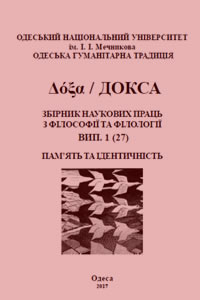ПІДРОБЛЮВАННЯ СПОГАДІВ, ОСОБИСТОСТІ ТА РЕАЛЬНОСТІ В ОПОВІДАННІ ФІЛІПА К. ДІКА “WE CAN REMEMBER IT FOR YOU WHOLESALE”
DOI:
https://doi.org/10.18524/2410-2601.2017.1(27).143720Ключові слова:
наукова фантастика, особистість, реальність, спогади, філософський розумовий експеримент,Анотація
Оповідання “We Can Remember It for You Wholesale” є прикладом епістемологічного скептицизму американського письменника-фантаста Філіпа К. Діка, який виявляється, з одного боку, як сумнів у справжності реальності, в рамках якої існує людина, а з іншого боку – як сумнів у справжності сприйняття людиною реальності, в рамках якої вона існує: жодні спогади, жодний досвід, жодна особистість, жодні моделі поведінки та жодні фізичні посвідчення усього цього не можуть бути абсолютним підтвердженням справжності реальності. Єдиним, більш- менш, прийнятним критерієм підтвердження реальності може бути лише метазнання, тобто знання того, що дещо реальне, проте саме метазнання теж може бути взято під сумнів.
Посилання
Dick P. K. (1983). We Can Remember It for You Wholesale. Vokrug sveta, Moscow, #8, pp. 47–51 (in Rus.)
Dick P. K. (2004). We Can Remember It for You Wholesale. Dick, P. K. Minority Report. Saint Petersburg, Amphora (in Rus.)
Canaan H. (2008). Time and Gnosis in the Writings of Philip K. Dick. Hungarian Journal of English and American Studies, vol. 14, #2, pp. 335–355.
Dick P. K. (1985). How to Build a Universe That Doesn’t Fall Apart Two Days Later. Dick P. K. I Hope I Shall Arrive Soon & Other Stories. New York, Doubleday, pp. 4–16.
Dick P. K. (1966). We Can Remember It for You Wholesale. The Magazine of Fantasy and Science Fiction, vol. 30, #4, pp. 4–23.
Glass F. (1990). Totally Recalling Arnold: Sex and Violence in the New Bad Future. Film Quarterly, vol. 44, #1, pp. 2–13.
Goldberg J. (1992). Recalling Totalities: The Mirrored Stages of Arnold Schwarzenegger. difference: A Journal of Feminist Cultural Studies, vol. 4, #1, pp. 172–204.
Grant B. K. (2016). Adventures in Perception: Endangering the Spectator in Science Fiction Movies. Redmond, S. (ed.) Endangering Science Fiction Film. Abingdon, Routledge, pp. 103–116.
Hodges J. J. (2011). Philip K. Dick and the Spectre of Subject: Master’s Thesis. Lancashire, University of Central Lancashire.
Landsberg A. (1995). Prosthetic Memory: Total Recall and Blade Runner. Featherstone, M. (ed.) Cyberspace / Cyberbodies / Cyberpunk: Cultures of Technological Embodiment. London, SAGE Publications, pp. 175–189.
Ndalianis A. (2001). Paul Verhoeven and His Hollow Men. Screening the Past, #13, pp. 1–17.
Schneider S. (2009). Introduction: Thought Experiments: Science Fiction as a Window into Philosophical Puzzles. Schneider, S. (ed.) Science Fiction and Philosophy: From Time Travel to Superintelligence. Hoboken, Wiley- Blackwell, pp. 1–14.
Vest J. P. (2007). Future Imperfect: Philip K. Dick at the Movies. Westport, Praeger.
##submission.downloads##
Опубліковано
Як цитувати
Номер
Розділ
Ліцензія
Авторське право (c) 2020 Докса

Ця робота ліцензується відповідно до Creative Commons Attribution-NonCommercial 4.0 International License.
Автори, які публікуються у цьому журналі, погоджуються з наступними умовами:
- Автори залишають за собою право на авторство своєї роботи та передають журналу право першої публікації цієї роботи на умовах ліцензії Attribution-NonCommercial 4.0 International (CC BY-NC 4.0).
- Автори мають право укладати самостійні додаткові угоди щодо неексклюзивного розповсюдження роботи у тому вигляді, в якому вона була опублікована цим журналом (наприклад, розміщувати роботу в електронному сховищі установи або публікувати у складі монографії), за умови збереження посилання на першу публікацію роботи у цьому журналі.
- Політика журналу дозволяє і заохочує розміщення авторами в мережі Інтернет (наприклад, у сховищах установ або на особистих веб-сайтах) роботи, оскільки це сприяє виникненню продуктивної наукової дискусії та позитивно позначається на оперативності та динаміці цитування опублікованої роботи (див. The Effect of Open Access).

